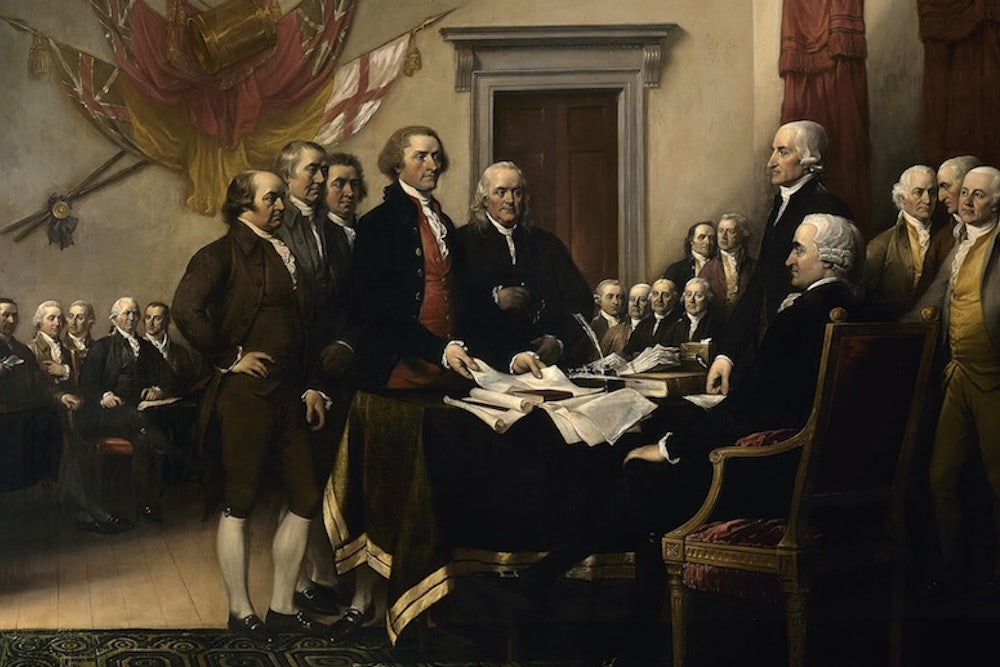There’s a new fight over the curriculum in American high schools, and this time it’s not about evolution or new math. The issue is U.S. History—specifically, advanced placement U.S. history.
Earlier this year, the College Board announced that it was modifying its model curriculum for the course. Conservatives are not at all happy about the changes. The new curriculum, they say, emphasizes negative aspects of U.S. history while giving short shrift to the nation’s triumphs. While the College Board has no formal power over what schools teach, it writes the test that A.P. students will take at the end of the year. For that reason, school systems tend to pay attention to what the College Board says. But in some more conservative parts of the country, authorities are resisting.
Earlier this month, the state Board of Education in Texas ordered school districts to use a statewide curriculum, rather than the College Board’s. In the western suburbs of Denver, the Jefferson County School Board is weighing a proposal to create a special committee for reviewing the history curriculum and notifying the board of objectionable material. What would qualify as “objectionable”? According to the proposal,
Materials should promote citizenship, patriotism, essentials and benefits of the free enterprise system, respect for authority and respect for individual rights. Materials should not encourage or condone civil disorder, social strife or disregard of the law. Instructional materials should present positive aspects of the United States and its heritage.
 That proposal has sparked a backlash. Last week, dozens of students from one Denver-area school walked out of class and took carpools over to the district headquarters, in order to protest what they said was an attempt to censor their educations. The kids organized the protest on Facebook and had several parents alongside them, as a show of support.
That proposal has sparked a backlash. Last week, dozens of students from one Denver-area school walked out of class and took carpools over to the district headquarters, in order to protest what they said was an attempt to censor their educations. The kids organized the protest on Facebook and had several parents alongside them, as a show of support.
If you want to learn more about the merits of the debate, Stanley Kurtz of National Review has written the definitive conservative critique, while Jamelle Bouie of Slate written a liberal rejoinder. I can’t say I’ve spent enough time with the curriculum to offer an informed judgment of my own. But it occurs to me that this controversy is part of a familiar divide in American politics. Just last week, the Pew Research Center for the People and the Press released a study on the different priorities liberals and conservatives have for education. Conservatives want schools to emphasize faith and obedience, while liberals are more likely to care about teaching tolerance and curiosity. You can guess how each group would react to a curriculum that asked some hard questions about U.S. history.
—Jonathan Cohn
News from the weekend
CLIMATE: New federal data shows U.S. pollution from power plants went up last year. But there's a silver lining: Obama's first-term climate initiatives—fuel-efficient cars and clean energy—seem to be helping slow the growth in emissions. (Joby Warrick, Washington Post)
This news will make you furious: Stunning recordings reveal that the regulators who were supposed to be looking over Wall Street's shoulder during the financial crisis just weren't doing it. (ProPublica, This American Life)
This news will make you more furious: The few rape victims who report to authorities find when they return from Louisiana hospitals that they owe thousands in medical bills. Amanda Hess at Slate points out how this shows the limitations of the Violence Against Women Act. (Rebecca Catalanello, Times-Picayune
How to change police behavior: Rachel Cohen says that if settlements for police misconduct came out of department budgets, rather than general funds for local governments, departments would act more aggresively to stop abuse. (American Prospect)
